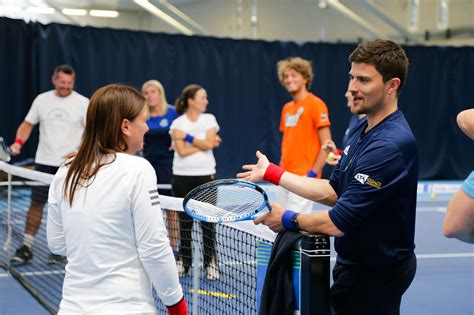Explore how coaches identify young tennis talent, enhance skills, nurture mental resilience, foster teamwork, and shape the future of tennis stars.In the world of tennis, the journey from aspiring player to skilled athlete is often steered by the guiding hand of a coach. The Role of Coaches in Developing Tennis Talent delves into the vital contributions coaches make in identifying and nurturing potential in young athletes. From honing technical skills and strategizing for success to instilling mental resilience and building supportive team dynamics, coaches play an indispensable role in shaping the future of tennis. This article explores how their expertise and dedication not only enhance individual performance but also cultivate a thriving environment for growth and collaboration. Join us as we uncover the multifaceted impact coaches have in turning raw talent into tomorrow’s tennis stars.
Identifying Potential: Coaches Discovering Young Tennis Talent
One of the most crucial aspects of The Role of coaches in tennis involves identifying young talent who have the potential to succeed on the court. Coaches are trained to recognize specific attributes that signal a player’s potential. These can include physical capabilities, such as speed, agility, and strength, as well as technical skills like stroke production and shot accuracy.
Observation plays a key role in talent identification. Coaches often attend local tournaments, school matches, and training sessions to scout promising players. They look for individuals who display not only raw athleticism but also the ability to learn and adapt quickly. A player’s attitude, work ethic, and willingness to embrace feedback are equally important indicators of potential success.
Additionally, coaches utilize comprehensive assessments and performance metrics to evaluate young athletes effectively. Tools such as video analysis and physical assessments help coaches understand each player’s strengths and weaknesses, paving the way for tailored development programs.
Through their expertise, coaches can identify young players who may not yet recognize their own potential. By providing encouragement and necessary training, they can help these athletes realize their capabilities and develop their skills further, ensuring a continuous pipeline of tennis talent.
The early detection of potential by coaches is vital for nurturing the next generation of tennis stars.
Skill Development: Coaches Enhancing Techniques and Strategies
The development of tennis skills is a multifaceted process that requires dedicated effort and expert guidance. Coaches play a crucial role in this journey by enhancing the athletic capabilities of their players through personalized training and strategic instruction. By employing a variety of techniques, coaches help athletes improve their performance on the court.
One of the primary responsibilities of coaches is to assess the current skill level of their players. This initial evaluation allows coaches to tailor their training programs to meet the specific needs of each individual. From serving techniques to stroke mechanics, the role of coaches is to identify areas for improvement and provide targeted drills designed to enhance these skills.
Moreover, coaches introduce players to advanced tactics and strategies that can be pivotal during matches. By teaching athletes how to read opponents and adapt their play styles accordingly, coaches equip them with the necessary tools to gain a competitive edge. This strategic mindset not only contributes to immediate performance but also cultivates the ability to think critically during intense match situations.
In addition to physical skills, coaches focus on the overall athletic development of their players. This includes integrating strength and conditioning programs into training regimens, which can significantly impact durability and resilience. By ensuring players engage in these programs, coaches enhance not just their skills but also their athleticism, endurance, and injury prevention.
The commitment of coaches to enhance techniques and strategies is vital for the growth of tennis talent. Through personalized guidance, strategic instruction, and holistic development, coaches fulfill the role of mentor and trainer, paving the way for future success on the tennis circuit.
Mental Resilience: The Role of Coaches in Nurturing Confidence
Mental resilience is a crucial aspect of athletic performance, particularly in competitive sports like tennis. Coaches play a pivotal role in developing this resilience, helping young athletes to build confidence and cope with the pressures of competition.
One of the primary responsibilities of a coach is to cultivate a positive mindset in their players. This involves teaching them how to manage stress, handle defeats, and maintain focus during high-stakes matches. Coaches often implement various mental training techniques, such as visualization exercises and positive self-talk, to equip players with the tools they need to overcome challenges.
Moreover, coaches offer consistent encouragement and constructive feedback. By recognizing and celebrating their players’ achievements, even small ones, coaches help athletes to believe in their abilities. This boost in confidence can make a significant difference in a player’s performance, providing them with the mental fortitude to push through tough situations.
In addition to fostering individual confidence, coaches also create a team environment that emphasizes resilience. When players support each other, share in successes, and learn from losses together, they develop a collective mental strength. This camaraderie and encouragement can alleviate the pressure on individual players, allowing them to perform better as a cohesive unit.
The role of coaches in nurturing mental resilience cannot be overstated. By fostering a culture of confidence and support, coaches are instrumental in shaping not just skilled tennis players but also mentally tough athletes who can thrive under pressure.
Creating a Supportive Environment: Coaches Foster Teamwork and Growth
In tennis, as in many sports, the environment in which athletes train and develop can significantly impact their success. Coaches play a crucial role in creating a supportive atmosphere that not only emphasizes individual performance but also nurtures collaboration and camaraderie among players. This holistic approach is vital in fostering teamwork, which is essential for individual growth and overall development.
One of the ways coaches foster a supportive environment is by promoting open communication. Encouraging players to express their thoughts, share experiences, and collaborate on strategies helps create a safe space for learning. When players feel heard and respected, their confidence flourishes, leading to better performance on the court.
Additionally, coaches can implement team-building activities that enhance relationships among players. These activities may include group drills, peer mentoring, or even social events outside of practice. Such interactions help players form bonds, encouraging them to support one another during challenging moments both on and off the court. The significance of mutual encouragement cannot be overstated, as players learn to rely on their teammates, thus reinforcing their commitment to achieving common goals.
A supportive environment also involves creating a culture of accountability. Coaches can establish clear expectations for behavior and performance, ensuring that all players understand their roles within the team. When players hold themselves and each other accountable, they cultivate a sense of responsibility that enhances their determination to succeed. The collaborative efforts fostered by coaches lead to increased motivation and collective resilience, allowing athletes to overcome obstacles together.
Moreover, embracing diversity within the team is essential for creating an inclusive environment. Coaches should be aware of the varied backgrounds and experiences of their players, using this knowledge to strengthen the team’s unity. Encouraging players to appreciate each other’s unique strengths can lead to enhanced teamwork, as athletes learn from one another and adopt diverse perspectives that can improve their game.
The role of coaches in developing a supportive environment cannot be underestimated. By fostering teamwork, promoting open communication, encouraging accountability, and embracing diversity, coaches are laying the foundation for future success. Ultimately, a supportive atmosphere allows players to thrive, enabling them to reach their full potential and pursue their passion for tennis with confidence.
Long-Term Success: How Coaches Shape Future Tennis Stars
Coaches play a pivotal role in laying the groundwork for long-term success in tennis, fundamentally influencing the trajectory of a player’s career. Their impact extends beyond the immediate skills and techniques to mold the player’s overall journey within the sport.
One of the most crucial aspects of this process is the development of a personalized training regimen. Coaches assess each athlete’s unique strengths and weaknesses, tailoring their approach to ensure optimal growth. This individualized attention not only enhances performance but also keeps players motivated and engaged in their training.
Furthermore, coaches serve as mentors, guiding young athletes through the challenges of competition and the pressures of success. By instilling a strong work ethic and emphasizing the importance of dedication, they equip players with the tools needed to navigate not just the physical demands of tennis, but also the mental hurdles that accompany high-stakes matches. This guidance helps in building a resilient mindset, vital for sustaining success over time.
Additionally, exceptional coaches often cultivate connections within the tennis community, opening doors for their players. These relationships can lead to valuable opportunities, such as entry into prestigious tournaments or access to better training facilities. The role of a coach here is to leverage their networks to benefit their athletes.
Finally, the emphasis on sportsmanship and the values of the game cannot be overstated. Through their guidance, coaches teach athletes the importance of respect, humility, and perseverance, shaping not just great players but also great individuals. Such values lay a strong foundation for a lifelong love of the sport—essential for anyone looking to achieve sustainable long-term success in tennis.
In summary, the role of coaches is instrumental in shaping future tennis stars. Their dedication and strategic approach enable players to reach their full potential, ensuring that they are not only equipped to excel on the court but also in life beyond tennis.
Frequently Asked Questions
What is the primary role of a coach in tennis talent development?
The primary role of a coach in tennis talent development is to guide and enhance the player’s skills, strategies, mental toughness, and physical conditioning to help them reach their full potential.
How do coaches identify potential tennis talent in young players?
Coaches identify potential tennis talent by observing a player’s athleticism, technique, work ethic, attitude, and ability to learn and adapt during training and competition.
What specific skills do coaches focus on when training young tennis players?
Coaches focus on a variety of skills, including stroke technique, footwork, match strategy, mental resilience, and physical fitness, to ensure comprehensive development.
How important is communication between coaches and players?
Communication between coaches and players is crucial as it fosters trust, enables feedback on performance, and helps tailor training to meet the player’s unique needs and goals.
What role does mental conditioning play in tennis coaching?
Mental conditioning is essential in tennis coaching as it helps players develop focus, confidence, and the ability to handle pressure during competitive matches.
In what ways do coaches support players beyond skill development?
Coaches support players by providing mentorship, helping them set realistic goals, managing their training schedules, and offering guidance on nutrition and recovery.
How can parents support their child’s tennis development alongside coaches?
Parents can support their child’s tennis development by encouraging their commitment, attending training sessions and matches, fostering a positive environment, and maintaining open communication with their child’s coach.









